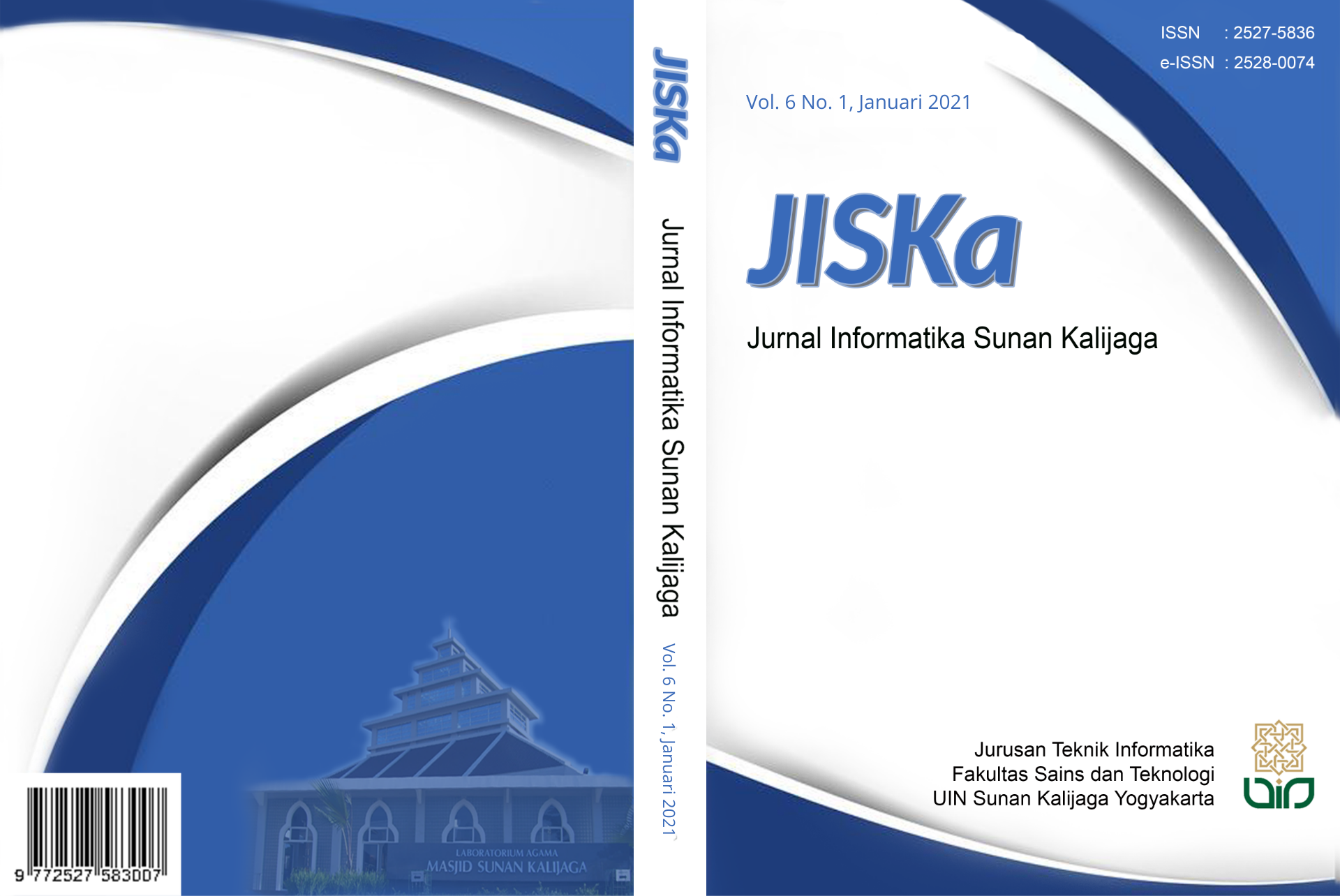Efisiensi ISO 27001, ISO 9001, dan Standar LPSE pada Data Center dan e-Procurement Pemerintahan
DOI:
https://doi.org/10.14421/jiska.2021.61-06Abstract
National government and regional government are developing public service by communication and information network. Provided public service must be reliable, trusted, and reachable. To fulfil that, there are standards that need to be implemented for example ISO 27001, ISO 9001, and LPSE Standard. The purpose of this paper is to create efficiency in implementing ISO 27001, ISO 9001, and LPSE Standard with the scope of data center infrastructure and e-procurement service (LPSE). This paper uses qualitative method. The data obtained from primary and secondary data through a case study from government that has successfully implemented those standards. The result of this paper is mapping that shows intersection of similarity and difference between ISO 27001:2013, ISO 9001:2015, dan LPSE Standard and efficiency of document requirement which previously 50 to 24 documents only.References
Achmadi, D., Suryanto, Y., & Ramli, K. (2018). On Developing Information Security Management System (ISMS) Framework for ISO 27001-based Data Center. 2018 International Workshop on Big Data and Information Security (IWBIS), 149–157. https://doi.org/10.1109/IWBIS.2018.8471700
Adjei-Bamfo, P., Maloreh-Nyamekye, T., & Ahenkan, A. (2019). The role of e-government in sustainable public procurement in developing countries: A systematic literature review. Resources, Conservation and Recycling, 142, 189–203. https://doi.org/10.1016/j.resconrec.2018.12.001
Alsaif, M., Aljaafari, N., & Khan, A. R. (2015). Information Security Management in Saudi Arabian Organizations. Procedia Computer Science, 56, 213–216. https://doi.org/10.1016/j.procs.2015.07.201
Amalia, S. (2018). Reformasi Birokrasi 4.0 : Strategi Menghadapi Revolusi Industri 4.0. Jurnal Wacana Kinerja: Kajian Praktis-Akademis Kinerja Dan Administrasi Pelayanan Publik, 21(2), 4–6. https://doi.org/10.31845/jwk.v21i2.133
Bounagui, Y., Mezrioui, A., & Hafiddi, H. (2019). Toward a unified framework for Cloud Computing governance: An approach for evaluating and integrating IT management and governance models. Computer Standards & Interfaces, 62, 98–118. https://doi.org/10.1016/j.csi.2018.09.001
Hoy, Z., & Foley, A. (2015). A structured approach to integrating audits to create organisational efficiencies: ISO 9001 and ISO 27001 audits. Total Quality Management & Business Excellence, 26(5–6), 690–702. https://doi.org/10.1080/14783363.2013.876181
Hwang, K., & Choi, M. (2017). Effects of innovation-supportive culture and organizational citizenship behavior on e-government information system security stemming from mimetic isomorphism. Government Information Quarterly, 34(2), 183–198. https://doi.org/10.1016/j.giq.2017.02.001
ISO. (2015). ISO 9001:2015 Quality management systems — Requirements.
Jonathan, K., Napitupulu, T. A., & Sari, R. (2017). IT good governance: A case of the role of e-Procurement in Indonesia. 2017 International Conference on Information Management and Technology (ICIMTech), 328–333. https://doi.org/10.1109/ICIMTech.2017.8273560
Muzaimi, H., Chew, B. C., & Hamid, S. R. (2017). Integrated management system: The integration of ISO 9001, ISO 14001, OHSAS 18001 and ISO 31000. AIP Conference Proceedings, 1818(1), 020034. https://doi.org/10.1063/1.4976898
Rachman, T., & Napitupulu, D. (2017). Model Kualitas e-Service dengan Pendekatan Meta-Etnografi. JURNAL IPTEKKOM : Jurnal Ilmu Pengetahuan & Teknologi Informasi, 18(2), 81–97. https://doi.org/10.33164/iptekkom.18.2.2016.81-97
Republik Indonesia. (2003). Instruksi Presiden Nomor 3 Tahun 2003 tanggal 9 Juni 2003 tentang Kebijakan dan Strategi Nasional Pengembangan E-Government. Instruksi Presiden.
Republik Indonesia. (2010a). Peraturan Kepala LKPP Nomor 2 Tahun 2010 tentang Layanan Pengadaan Secara Elektronik. Peraturan Kepala LKPP.
Republik Indonesia. (2010b). Peraturan Presiden Nomor 54 Tahun 2010 tentang Pengadaan Barang/Jasa Pemerintah. Peraturan Presiden.
Republik Indonesia. (2015). Peraturan Kepala LKPP Nomor 9 Tahun 2015 tentang Peningkatan Layanan Pengadaan Secara Elektronik. Peraturan Kepala LKPP.
Republik Indonesia. (2016). Peraturan Menteri Komunikasi dan Informatika Nomor 4 Tahun 2016 tentang Sistem Manajemen Pengamanan Informasi. Peraturan Menteri.
Safa, N. S., Maple, C., Watson, T., & Von Solms, R. (2018). Motivation and opportunity based model to reduce information security insider threats in organisations. Journal of Information Security and Applications, 40, 247–257. https://doi.org/10.1016/j.jisa.2017.11.001
Samani, M. A., Ismail, N., Leman, Z., & Zulkifli, N. (2019). Development of a conceptual model for risk-based quality management system. Total Quality Management & Business Excellence, 30(5–6), 483–498. https://doi.org/10.1080/14783363.2017.1310617
Saputra, A. (2018). Rancangan Tata Kelola Organisasi Sistem Manajemen Keamanan Informasi Dinas Komunikasi dan Informatika Kabupaten Bekasi (Organization Governance Design of Information Security Management System Bekasi Communications and Information Technology Agency). JURNAL IPTEKKOM : Jurnal Ilmu Pengetahuan & Teknologi Informasi, 20(1), 17. https://doi.org/10.33164/iptekkom.20.1.2018.17-29
Seo, D., Tan, C.-W., & Warman, G. (2018). Vendor satisfaction of E-government procurement systems in developing countries: an empirical research in Indonesia. Information Technology for Development, 24(3), 554–581. https://doi.org/10.1080/02681102.2018.1454878
Suwito, M. H., Matsumoto, S., Kawamoto, J., Gollmann, D., & Sakurai, K. (2016). Information Science and Applications (ICISA) 2016. In K. J. Kim & N. Joukov (Eds.), Information Science and Applications (Vol. 376). Springer Singapore. https://doi.org/10.1007/978-981-10-0557-2
Witara, K. (2017). Keterlibatan Karyawan Terhadap Implementasi Sistem Manajemen Mutu ISO 9001 : 2008 di PT.House of Quality. Media Mahardhika, 15(3), 276–294.
Zainuri, M. (2017). Perancangan Rencana Keberlangsungan Kegiatan LPSE Pemda DIY. UNIVERSITAS GADJAH MADA.
Downloads
Published
How to Cite
Issue
Section
License
Authors who publish with this journal agree to the following terms as stated in http://creativecommons.org/licenses/by-nc/4.0
a. Authors retain copyright and grant the journal right of first publication with the work simultaneously licensed under a Creative Commons Attribution License that allows others to share the work with an acknowledgement of the work's authorship and initial publication in this journal.
b. Authors are able to enter into separate, additional contractual arrangements for the non-exclusive distribution of the journal's published version of the work (e.g., post it to an institutional repository or publish it in a book), with an acknowledgement of its initial publication in this journal.
c. Authors are permitted and encouraged to post their work online (e.g., in institutional repositories or on their website) prior to and during the submission process, as it can lead to productive exchanges, as well as earlier and greater citation of published work.






